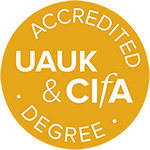Current filters applied:
- (-) Remove Current Projects filter Current Projects
- (-) Remove Computational and Quantitative Archaeology filter Computational and Quantitative Archaeology
Displaying 13 projects
The 10th-5th centuries BCE (the first centuries of the Iron Age) witnessed significant societal transformations across the Mediterranean. Populations grew in many regions, the first genuine economic integration of the basin occurred through maritime interaction and overseas settlement, and, for the...
EHSCAN is a Horizon-MSCA-2022-PF scheme Fellowship Funded by UKRI and hosted by the McDonald Institute for Archaeological Research, University of Cambridge. The aim is to understand the cultural dynamics and transmission means of material culture in North Africa during the Early Holocene period (~...
ENCOUNTER investigates the Jomon-Yayoi transition, a demic and cultural diffusion event that led the predominantly hunting, gathering, and fishing-based communities of the Japanese islands to adopt rice and millet farming during the 1st millennium BC.
During the Early and Middle Bronze Age (2500-1600 B.C), a range of exchange networks linked Arabia, Iraq, Iran, Bahrain and South Asia, facilitating the long-distance movement of a wide variety of raw materials and finished products. Texts from the Sargonic and Ur III period (2300-2000 BC) provide...
Our knowledge of human evolution is limited by several factors. One is tightly linked to the nature of the fossil record, as bones of our extinct human relatives and other primate species rarely appear in archaeological and paleontological sites, and when they do, they very commonly appear in an...
This archaeology-led initiative focuses on the East Anglian Fens, an extraordinary landscape where exceptional preservation of organic artefacts and environmental evidence gives unparalleled insights into the last 5,000 years of communities, resources and habitats. The Fens are the richest and most...
Image: Ancient pastoralist settlement viewed from the air, Amboseli, Kenya. Photo: P. Lane. Mapping Africa's – Endangered Archaeological Sites and Monuments (maeasam.org) project aims to identify and document endangered archaeological heritage sites across Africa using a combination of remote...
The Mapping Archaeological Heritage in South Asia ( MAHSA ) project, now in its Phase 2, will continue to document the endangered archaeology and cultural heritage of the Indus River Basin and the surrounding areas and publish this information in an Open Access Arches geospatial database. Over the...
Stone tool artefacts represent the only continuous material record from early hominins across a period of three million years. Lithics provide information about early human technological adaptations and innovations, and in turn, understanding these technologies allows insights into early human...
SILKGLASS is a Horizon Europe MSCA-PF fellowship funded by UKRI and hosted by the McDonald Institute for Archaeological Research, University of Cambridge. Central Asia is traditionally seen as a passive Silk Roads throughway rather than an active and creative node. SILKGLASS seeks to investigate...
PersianTRAIL is a research project using Geographic Information Systems (GIS), Remote Sensing (RS), and historical-archaeological data to reconstruct the Persian Royal Road (PRR), a key infrastructure of the Achaemenid Empire (6th–4th century BCE). The project examines factors like topography...
The PlaCe network is a high-profile partnership focused on the interdisciplinary study of pre-modern ceramics and plasters. This Innovative Training Network aims at training Early-Stage Researchers to conduct state-of-the-art, science-based research on the technology, use, and provenance of...
The transition from Oldowan to Acheulean technologies are hypothesised to be concomitant with advances in cognition and behaviour. However, the nature of these shifts, and their cultural and evolutionary implications are poorly defined and understood. While extensive literature exists on these...


